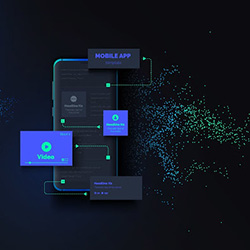AI is Changing Mobile Development
[ad_1]
 Over the last decade, mobile apps and mobile user experiences have evolved drastically. While we first had simple apps that did the bare minimum, recent mobile app development has led to a lot of changes. And one of the main factors that have helped in this dramatic change is the evolution and use of artificial intelligence.
Over the last decade, mobile apps and mobile user experiences have evolved drastically. While we first had simple apps that did the bare minimum, recent mobile app development has led to a lot of changes. And one of the main factors that have helped in this dramatic change is the evolution and use of artificial intelligence.
From our social media platforms to our daily chores on the phone, everything is dominated by machine learning and artificial intelligence technology. Here are some of how AI has affected mobile application development in the last couple of years.
Want More Tech News? Subscribe to ComputingEdge Newsletter Today!
Effects Of Artificial Intelligence On Mobile Application Development
Facial Recognition
The face recognition lock has been one of the most significant parts of Android smartphones due to its simple-to-use nature and an extra layer of protection. These technologies use AI and ML-based techniques to recognize a person’s face to unlock the phone and the numerous apps placed on it.
In the next few years, smartphone makers are likely to use even more advanced AI and ML to recognize people as their facial traits change, such as wearing glasses or having a beard.
Search Engines
One of the most prevalent advancements in machine learning and artificial intelligence is voice commands and voice search. Users used to type their search terms into search engines. Asking your digital assistant to search for something is now a simple task.
Rather than logging into your computer or opening your phone, something as simple as “hello google, what’s the best restaurant around me?” gives users the instant answer they’re looking for while also sending them to your business. You can answer text messages using voice commands instead of typing.
Smart Camera Apps
One of the most crucial areas in which customized mobile app development professionals and mobile producers make substantial AI and ML advancements in the smartphone camera. These sophisticated cameras can recognize subjects in the picture, such as fireworks or faces, and modify the settings to give the best available image.
Machine learning can instantly detect and improve facial features for fantastic portrait photographs. Advanced capabilities can even tally the calories you consume from a photo of your meal or inform businesses on how and where their items are being used when photos are posted on social media platforms.
Emotion Recognition
Emotion recognition is a hot topic in AI research. We’ve now developed to the point where we can combine machine learning and artificial intelligence into apps and record micro and macro expressions. The software can now interpret human emotions by recording small fluctuations, body language cues, and vocal intonation using image and sound data processing. Companies can utilize these analytics to improve customer experiences by detecting a product or service’s need or to generate new product ideas.
Real-Time Translation
There are numerous translation apps available. The majority of these programs, however, are unplayable without internet access. Smartphones could use AI to translate and transliterate several languages in real-time without an internet connection.
Like how translators work, AI can give a language training tool that lets words and phrases be translated quickly without a time lag. AI can be used to alter the translation tool’s latency. It states that the user can specify the interval value between a spoken word and its translation. It would benefit languages where effective translation requires a more significant time lag.
Conclusion
Thus, we can conclude that artificial intelligence technology has opened up many new avenues for the mobile app development process. There is now a better user experience and interactions, with better linking to a vast ecosystem of intelligent applications. It has also helped improve user engagement and business growth worldwide.
[ad_2]
Source link
